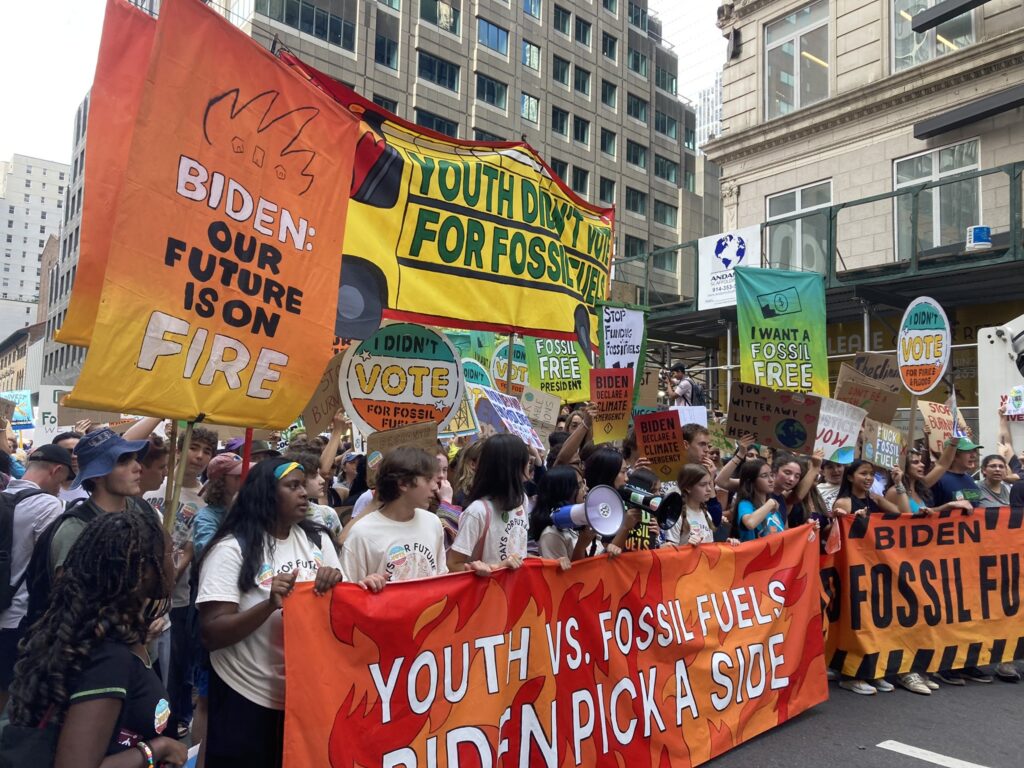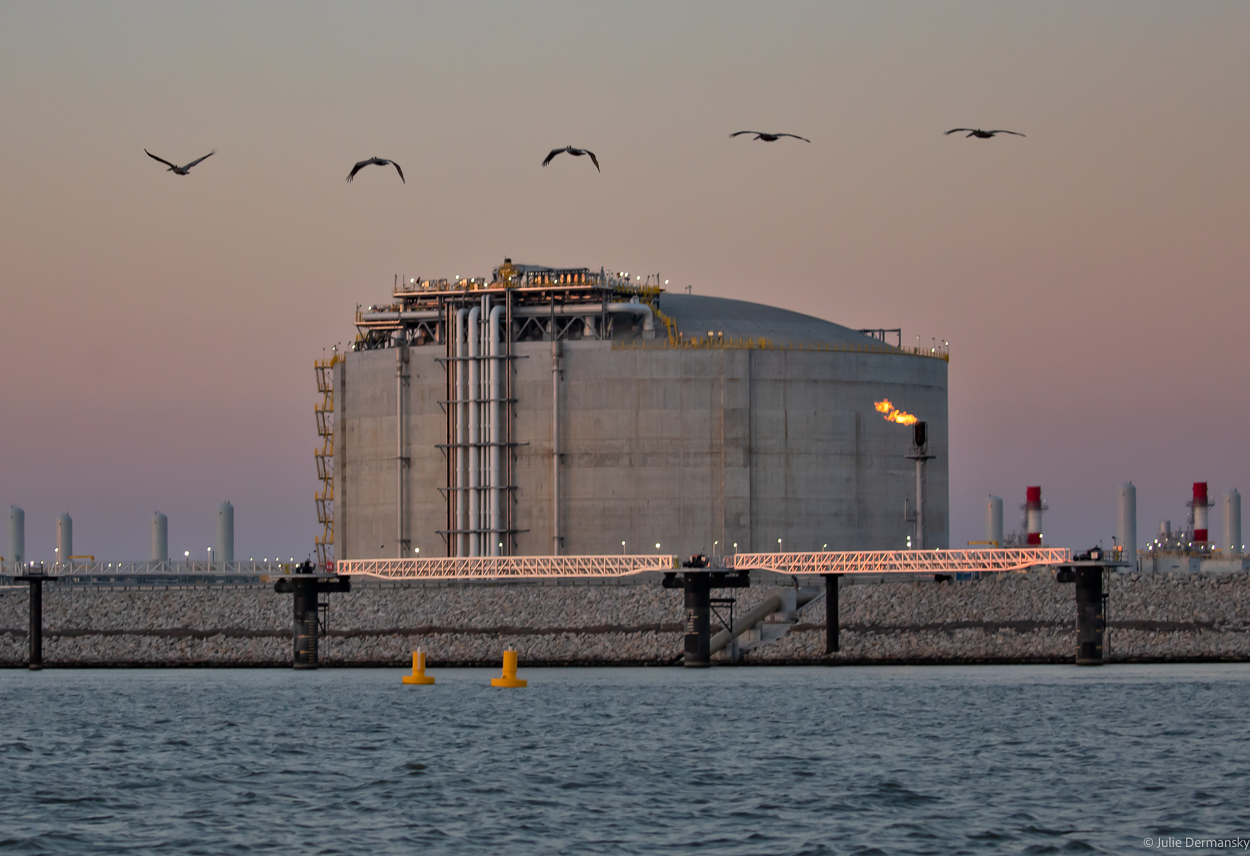A new report warns that oil and gas production in the United States is expected to rise under Biden’s signature climate law, the Inflation Reduction Act (IRA), even as the legislation helps to moderately lower fossil fuel demand through billions of dollars in clean energy investments.
The report, “Biden’s Fossil Fuel Fail: How U.S. Oil and Gas Supply Rises under the Inflation Reduction Act, Exacerbating Environmental Injustice,” details how, despite the IRA’s significant spending on renewable energy, electric vehicles, and batteries, the policy will not be enough for the U.S. to meet its 2030 climate target of reducing greenhouse gas (GHG) emissions by 50 to 52 percent below 2005 levels.
Oil Change International’s (OCI) report analyzes data from the Rhodium Group – which projects U.S. emissions and fossil fuel supply and demand trends under existing policies. It finds that, rather than managing a phase-out of fossil fuels, the IRA is set to lead to a major expansion of oil and gas extraction and skyrocketing exports, which ultimately threatens frontline and environmental justice communities.
“It’s clear that President Biden’s promises made to frontline communities are nothing but a smokescreen,” Roishetta Sibley Ozane, founder of the Vessel Project of Louisiana and a mother of six who resides in southwest Louisiana, said in a press release accompanying the report.
“The Inflation Reduction Act leaves a massive escape hatch for the fossil fuel industry to continue its destructive practices, and my family battles the real consequences from fossil fuel production every day.”
According to the new analysis, based on previously unpublished data from Rhodium Group’s Climate Deck model, production of oil and gas is set to increase by 13 percent and seven percent, respectively, through 2035. And while domestic demand is expected to drop slightly during this time – by 10 percent for oil and 16 percent for gas – oil and gas exports are projected to surge. The data indicates oil exports will rise by 23 percent and gas exports will nearly double by 2035. Most concerning, gas consumption by energy-hungry liquified natural gas (LNG) export plants is expected to grow by 140 percent.
“The projected growth in U.S. oil and gas exports substantially undermines domestic emissions reductions,” the report argues.
Massive LNG Export Expansion Threatens Climate
Under the Inflation Reduction Act, the fossil fuel industry gets a big boost through elevated carbon capture tax credits as well as new federal oil and gas leasing mandates and guaranteed approval of the Mountain Valley fracked gas pipeline.
As Sen. Joe Manchin of West Virginia wrote in a Wall Street Journal op-ed in September, “Because of the Inflation Reduction Act, we are producing fossil fuels at record levels.” The legislation even chains solar and wind development on public lands to fossil fuels by requiring the federal government to offer oil and gas leases before holding auctions for renewables. Much of the new supply from this increased oil and gas production is going into exports.
Rapid expansion of U.S. liquified natural gas (LNG) export capacity, concentrated along the Texas and Louisiana Gulf Coast, is especially detrimental to achieving the U.S.’s climate goals. The U.S. currently has eight existing LNG export terminals in operation, with at least seven more under construction, and even more planned. If all of the planned LNG export projects get approved, the total greenhouse gas emissions impact from overall LNG export capacity would amount to 3.9 gigatons annually. That’s larger than the emissions from the entire European Union, and roughly equivalent to emissions from more than 1,000 coal plants or 850 million gasoline-powered vehicles – according to a new study.
“If the LNG buildout goes ahead as the industry plans, it will wipe out every bit of progress America has made on reducing emissions since 2005,” prominent climate author and activist Bill McKibben writes in the forward to that study, which was written by climate analyst Jeremy Symons of Symons Public Affairs. “If the LNG buildout goes ahead as the industry plans,” McKibben adds, “the U.S. will be the greatest climate hypocrite of all time.”
A new pre-print paper by scientist and Cornell University Professor Robert Howarth further warns that “total greenhouse gas emissions from LNG are larger than those from coal.” Howarth’s analysis examines lifecycle GHG emissions from U.S. LNG production and export, taking into account the shipping of the fuel.
In addition to the climate impact, the LNG export terminal buildout exacerbates environmental injustice in the communities on the frontlines of this industrial expansion.
“It is unfair that my children cannot breathe clean air and drink clean water because of the fossil fuel industries that we currently have in and around my community,” Ozane said during a recent media briefing sponsored by a coalition called Gas Exports Today. “Yet, the U.S. government wants to put more than 10 more liquified natural gas (LNG) facilities in our community. But we know there is nothing natural about these facilities.”

Biden’s Climate Legacy on the Line
In remarks delivered to the United Nations General Assembly in New York in September, U.S. President Joe Biden told assembled delegates that his administration has, from day one, treated the climate crisis “as an existential threat … not only for us but for all of humanity.”
The President continued to tout one of his greatest legislative achievements – the Inflation Reduction Act (IRA) enacted in August 2022: “Last year I signed into law in the United States the largest investment ever anywhere in the history of the world to combat the climate crisis and help move the global economy toward a clean energy future.”
However, the Inflation Reduction Act does nothing to curb the expansion of LNG export capacity and of fossil fuel production broadly, and, as the OCI report notes, it actually requires new fossil fuel leasing and incentivizes fossil fuel-enabling projects like carbon capture and storage (CCS) and fossil hydrogen coupled with carbon capture.
These “false climate solutions” as climate activists call them, are little more than greenwashing schemes designed to “distract and delay,” Collin Rees, U.S. program manager at Oil Change International and co-author of the new report, said during the recent Gas Exports Today media briefing.
“We are seeing a massive expansion of this greenwashing rhetoric,” he said. “We’re very worried that rhetoric will continue to expand in the context of the [upcoming] COP28 climate talks.”
The new OCI report also notes that under the IRA, the U.S. could potentially see emissions reductions of 51 percent by 2035 in the best-case scenario, which is still five years too late. By 2030 emissions may fall 34 percent (below 2005 levels), missing the 50 to 52 percent target by 16 to 18 percentage points. The finding of a sizable gap between current U.S. climate policy and stated emission reduction commitments is consistent with other analyses, such as a new study from the Union of Concerned Scientists on how the U.S. can meet its climate goals.
Reaching emission reduction targets, as well as protecting public health and frontline communities, requires sharp declines in fossil fuel production and use, experts say.
The U.S., however, is moving in the opposite direction, with the largest oil and gas expansion plans out of any country in the world. A report from OCI in September found the U.S. alone is poised to account for over one-third of planned global oil and gas expansion through 2050.
“At COP28 the spotlight will be on our collective effort to end the fossil fuel era,” Rees said in a press release accompanying OCI’s new report. “Will the United States deliver, or will Biden’s climate legacy be one of disastrous oil and gas expansion and failure to adequately tackle the climate crisis?”
Subscribe to our newsletter
Stay up to date with DeSmog news and alerts







